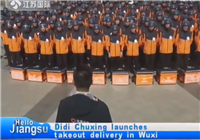Chinese taxi booking and car hire service app Didi Chuxing has launched a new takeout delivery service called Didi Waimai or Didi Takeout Delivery in Wuxi city, Jiangsu province, with more services to be followed in Nanjing, Changsha, Fujian, Jinan, Ningbo, Wenzhou, Chengdu, and Xiamen, according to online media outlet Caijing.
Ride-hailing giant Didi Chuxing Technology Co. Ltd. has moved into the takeout delivery business, encroaching on the turf of online services company Meituan-Dianping, which itself just got into ride-hailing.
The company confirmed it is running a pilot food delivery service in Wuxi, a city in southern Jiangsu province. But there are plans to expand to other locations in the future.
Didi is seeking both full-time and freelance deliverymen, with the full-time position offering a minimum monthly wage of 10,000 yuan, according to a job vacancy advertisement posted online on Thursday.
Didi claims the service, which launched on April 1, has already captured one-third of the market. But as TechCrunch pointed out, food delivery services often attract new customers with special deals, so it’s too early to take any data seriously.
Didi Chuxing also said it recently raised $1.6 billion for the new business and began recruiting delivery drivers in Wuxi last month, according to TechCrunch’s Chinese partner site TechNode.
Luo Wen, who leads the new Didi service, said the company plans to complete the Wuxi trial “as swiftly as possible” in order to launch the food delivery platform in additional locations.
Didi has been looking to enter the food delivery sector as early as last December, and sources have pointed out that Didi had been engaged in the R&D of food delivery service.
The company has made plenty of moves to expand its reach. It acquired Uber’s China-based business in 2016. And since Uber was backed by Baidu, the deal meant Didi had the three biggest tech firms in China as investors, with the other two being Alibaba and Tencent.
And late last year, Didi announced it raised $4 billion in new capital, adding to the $13 billion from investors, including Alibaba, Tencent and Apple, among others. The focus of that round of funding, according to the company, will be to expand the company footprint globally, further develop their electric vehicle initiative and invest more aggressively in artificial intelligence tech.
(Source: JIangus International Channel)






